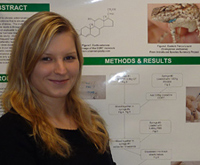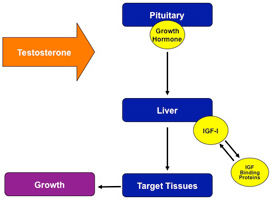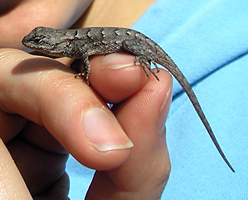Study of Testosterone Pathway and Growth Rate of Lizards
 Daria Pazdzior has always been fascinated by reptiles. In Introduction to Animal Sciences, Daria asked her instructor if there was a place at Rutgers where she could get experience handling and raising lizards or snakes. Her professor sent her to Henry John-Alder.
Daria Pazdzior has always been fascinated by reptiles. In Introduction to Animal Sciences, Daria asked her instructor if there was a place at Rutgers where she could get experience handling and raising lizards or snakes. Her professor sent her to Henry John-Alder.
After joining the John-Alder laboratory as a sophomore, Daria first assisted on research investigating the effects of pesticides on amphibian development. Next Daria began working closely with Christine Duncan, a PhD student, on experiments in which testosterone levels were manipulated in captive lizards.
 Testosterone is largely considered a growth-enhancing hormone, associated with larger body size and other features in the males across many taxa. However, in species in which females are larger, testosterone still appears to affect growth, but this time negatively. Lizards, with suites of closely related species showing both male- and female-larger species, provide a perfect study system for investigating the relationships between testosterone and growth.
Testosterone is largely considered a growth-enhancing hormone, associated with larger body size and other features in the males across many taxa. However, in species in which females are larger, testosterone still appears to affect growth, but this time negatively. Lizards, with suites of closely related species showing both male- and female-larger species, provide a perfect study system for investigating the relationships between testosterone and growth. 
Christine has worked with eastern fence lizards (Sceloporus undulatus; female-larger) to analyze the effect of supplemental testosterone administered to juveniles and adults. She is investigating the pathway from testosterone to growth via the IGF-I hormone (see Figure). Her initial findings showed inhibition of growth rate in supplemented fence lizards as predicted. In juvenile male and female fence lizards, supplemental testosterone decreased liver IGF-I expression, which was accompanied by a decrease in growth rate, food
intake, and body condition. This down-regulation of IGF-I by testosterone is an
especially novel finding because most published work draws the conclusion
that testosterone is a stimulant of IGF-I. 
Daria is one of four student caretakers of the lizards, responsible for feeding, watering, and measuring them weekly. In addition, she assisted with surgeries, and has been applying molecular biology techniques to analyze RNA and gene expression. After graduating from Rutgers, Daria plans to earn her Master of Science degree and continue with laboratory research. The best thing about her research experience? "Tending her own zoo of lizards." This kind of hands-on research provides the perfect start to a successful career in biology.


